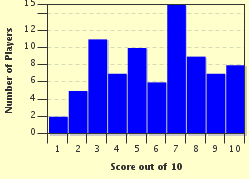Quiz Answer Key and Fun Facts
1. Sir Joseph Banks was born in London in 1743. Which of the following best describes the family he was born into?
2. At the age of 23, Joseph Banks travelled to Newfoundland and Labrador to catalogue the flora and fauna. Which now extinct bird is Banks believed to have identified during his visit to these islands?
3. Joseph Banks is perhaps best known for his part in the first voyage of James Cook aboard the HMS Endeavour. What role did Banks perform in this voyage?
4. Of the first Cook voyage, it was the Pacific island of Tahiti that left the greatest impression on Sir Joseph Banks. Which of the following best describes Banks' behaviour on Tahiti?
5. Sir Joseph Banks' contributions to the first Cook voyage were invaluable. As well as the specimens he described, he also is credited by some with popularising a custom of the natives of Tahiti. Which custom was this?
6. Unlike many of his shipmates on board HMS Endeavour, Joseph Banks managed to survive the trip back to England. At which location did many of the crew become blighted by malaria and dysentery, effectively reducing the ship's numbers by half?
7. Joseph Banks, upon returning home to England, arrived with celebrity status. Another thing he arrived with received much attention from gentlemen and scientists, and even the king. What did Banks bring back after the first Cook voyage?
8. After returning from the South Pacific, Joseph Banks continued his exploration, though in a less exotic ways. Which man, described as an "apostle of Linnaeus", accompanied Banks to the Isle of Wight, islands of Scotland, and to Iceland?
9. Joseph Banks' wealth and charm worked in his favour and in 1778 he was elected president of the Royal Society. Banks did a huge amount to promote scientific exploration and is seen as a major figure in the "Age of Wonder". What else is notable of Banks' presidency?
10. Joseph Banks has been criticised for getting to the position he did on his connections rather than his ability. However, probably his most important contribution was the promotion of international scientific endeavours. What made this particularly important?
Source: Author
doublemm
This quiz was reviewed by FunTrivia editor
bloomsby before going online.
Any errors found in FunTrivia content are routinely corrected through our feedback system.

